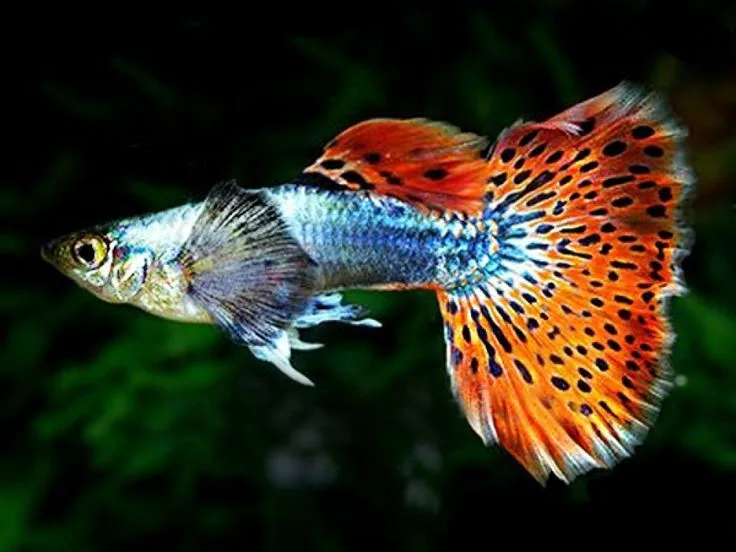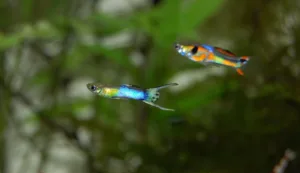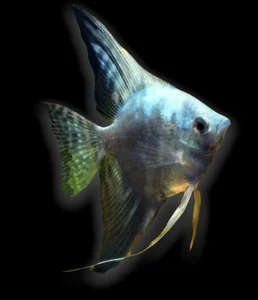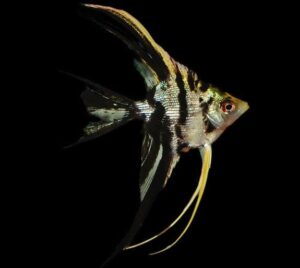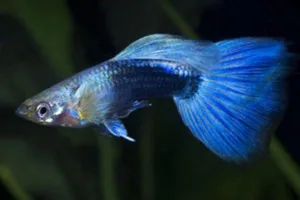Introduction
Guppies, scientifically known as Poecilia reticulata, are one of the most popular and widely kept tropical fish species in the aquarium hobby. They are prized for their vibrant colors, ease of care, and, of course, their fascinating lifespan and aging patterns. In this blog post, we will delve into the intricacies of guppy lifespans and aging, exploring what you can expect for each breed. From Guppy Lifespan to Aging Characteristics, we will provide you with the expert knowledge you need to ensure the well-being of your guppy companions.
Guppy Lifespan
Guppies are generally known for their relatively short lifespan when compared to other fish species. However, this can vary depending on various factors such as genetics, care, and environmental conditions. The typical lifespan of a guppy falls within the range of 1 to 3 years. To put it more precisely, here’s a table detailing the average lifespan for different guppy breeds:
| Guppy Breed | Average Lifespan |
|---|---|
| Common Guppy | 1 to 2 years |
| Endler’s Guppy | 2 to 3 years |
| Fancy Guppy | 2 to 3 years |
It’s important to note that these are general guidelines, and individual variations can occur.
Factors Influencing Lifespan
Several key factors impact the lifespan of guppies:
1. Genetics
Guppy lifespan is influenced by genetic factors. Breeds that have been selectively bred for desirable traits like color and fin shape may have shorter lifespans due to the potential side effects of such breeding practices. Conversely, wild-type guppies or those bred for hardiness may live longer.
2. Water Quality
Maintaining good water quality is paramount for guppy longevity. Regular water changes, proper filtration, and consistent monitoring of water parameters, including temperature, pH, and ammonia levels, are essential for their well-being.
3. Nutrition
Guppies require a balanced diet to thrive. Quality fish food with essential nutrients, including proteins and vitamins, will contribute to a longer lifespan.
4. Stress
Stress can significantly affect guppy lifespan. Ensure a peaceful and low-stress environment by avoiding overpopulation, providing adequate hiding spots, and minimizing sudden changes in their habitat.
Aging Characteristics
Understanding the aging process of guppies is crucial for their care and well-being. As guppies age, they exhibit various physical and behavioral changes that can help you determine their age and overall health. Here’s a comprehensive overview of aging characteristics for guppies:
1. Color Fading
One of the most apparent signs of aging in guppies is the fading of their vibrant colors. This is especially noticeable in fancy guppies, which are known for their striking hues. As they age, their colors may become less vivid and more muted.
2. Slower Movements
Elderly guppies tend to swim more slowly and with less vigor than their younger counterparts. This decrease in activity is a common sign of aging.
3. Curved Spine
Aging guppies may develop a curved or hunched spine. This condition is often referred to as “hunchback” or “S” back, and while it doesn’t necessarily affect their overall health, it is a sign of aging.
4. Reduced Fertility
Female guppies may become less fertile as they age. They might produce fewer fry (baby guppies), and the survival rate of the fry they do produce may decrease.
5. Longer Gestation Period
The gestation period of pregnant guppies may increase with age. Older females may take longer to give birth, and the size of the broods they produce may decrease.
6. Decreased Appetite
Aging guppies may eat less than their younger counterparts. This reduction in appetite is generally attributed to a slower metabolism.
Breed-Specific Aging Characteristics
Different guppy breeds may exhibit varying aging characteristics due to their unique genetics and selective breeding. Here’s a summary of what to expect for each breed:
Common Guppy
- Color Fading: Common guppies may experience color fading more quickly due to their often intense breeding practices, which prioritize colors over longevity.
- Slower Movements: As with other guppy breeds, common guppies will slow down with age.
- Curved Spine: The risk of developing a curved spine is relatively high in common guppies.
- Reduced Fertility: Female common guppies may exhibit reduced fertility as they age, with fewer and smaller broods.
Endler’s Guppy
- Color Fading: Endler’s guppies are known for their vivid colors, which may fade somewhat as they age.
- Slower Movements: Like common guppies, Endler’s guppies also swim more slowly with age.
- Curved Spine: While not exclusive to this breed, the risk of a curved spine is present.
- Reduced Fertility: Female Endler’s guppies may experience decreased fertility over time.
Fancy Guppy
- Color Fading: Fancy guppies may experience color fading as they age, but the effect might be less pronounced than in common guppies due to selective breeding for longevity.
- Slower Movements: Fancy guppies will also exhibit slower movements with age.
- Curved Spine: As with other breeds, some individuals may develop a curved spine.
- Reduced Fertility: While fancy guppies are bred for their striking appearances, their fertility may decline as they age.
Breed-Specific Aging Characteristics for Moscow, Cobra, and Delta Guppies
In addition to the common, Endler’s, and fancy guppy breeds, there are several other guppy breeds that enthusiasts often keep. Moscow, Cobra, and Delta guppies are notable for their distinctive characteristics and appearance. While some aging characteristics are common across guppy breeds, there may be breed-specific variations. Let’s explore the aging characteristics of these unique guppy breeds:
Moscow Guppies
Moscow guppies are prized for their solid and intense colors, making them stand out in the world of guppy breeding. These guppies are known for their distinct characteristics, both in their prime and as they age:
Aging Characteristics for Moscow Guppies
- Color Retention: Moscow guppies tend to retain their vibrant colors even as they age. This breed’s solid and intense colors are a defining trait, and this trait often remains relatively stable throughout their lives.
- Slower Movements: Like other guppies, Moscow guppies may exhibit slower movements with age, although their colors will likely remain vivid.
- Reduced Fertility: Female Moscow guppies might experience a decrease in fertility as they age, potentially producing fewer fry and smaller broods.
- Longevity: Moscow guppies are often bred with an emphasis on maintaining their color and overall health, potentially resulting in a longer lifespan compared to some other guppy breeds.
Cobra Guppies
Cobra guppies are known for their unique color patterns that resemble a cobra snake. These distinctive patterns often extend from their head to their tail, making them a popular choice among guppy enthusiasts. Here are their specific aging characteristics:
Aging Characteristics for Cobra Guppies
- Color Fading: Cobra guppies may experience color fading as they age, especially in the distinctive cobra-like patterns. The intensity of these patterns can diminish over time.
- Slower Movements: Like other guppy breeds, cobra guppies might exhibit slower movements as they grow older.
- Curved Spine: While the likelihood of developing a curved spine isn’t exclusive to Cobra guppies, it is a possibility with aging.
- Reduced Fertility: Female Cobra guppies may experience reduced fertility with age, producing fewer fry and potentially smaller broods.
Delta Guppies
Delta guppies are known for their triangular-shaped tails and vibrant colors, making them a visually striking breed. As they age, Delta guppies exhibit aging characteristics similar to other guppy breeds, but with some specific considerations:
Aging Characteristics for Delta Guppies
- Color Fading: Delta guppies may experience color fading as they age, especially in their vibrant tails. The intensity of their colors can diminish over time.
- Slower Movements: Like other guppies, Delta guppies may swim more slowly as they age.
- Curved Spine: While not exclusive to Delta guppies, some individuals may develop a curved spine as they get older.
- Reduced Fertility: Female Delta guppies may experience decreased fertility as they age, with the possibility of fewer fry and smaller broods.
Understanding these aging characteristics specific to Moscow, Cobra, and Delta guppies is essential for the proper care of these distinctive breeds. While some aging traits are common to most guppy breeds, the variations in color retention, patterns, and longevity among these breeds require breed-specific attention to maintain their health and vibrancy as they age.
In conclusion, guppy lifespan and aging characteristics vary among breeds, but the general trends include color fading, reduced activity, potential spine curvature, and decreased fertility. Understanding these aging patterns is vital for providing appropriate care and recognizing when your guppies may need extra attention as they grow older. By monitoring their health and ensuring optimal living conditions, you can help your guppies lead longer and healthier lives.

